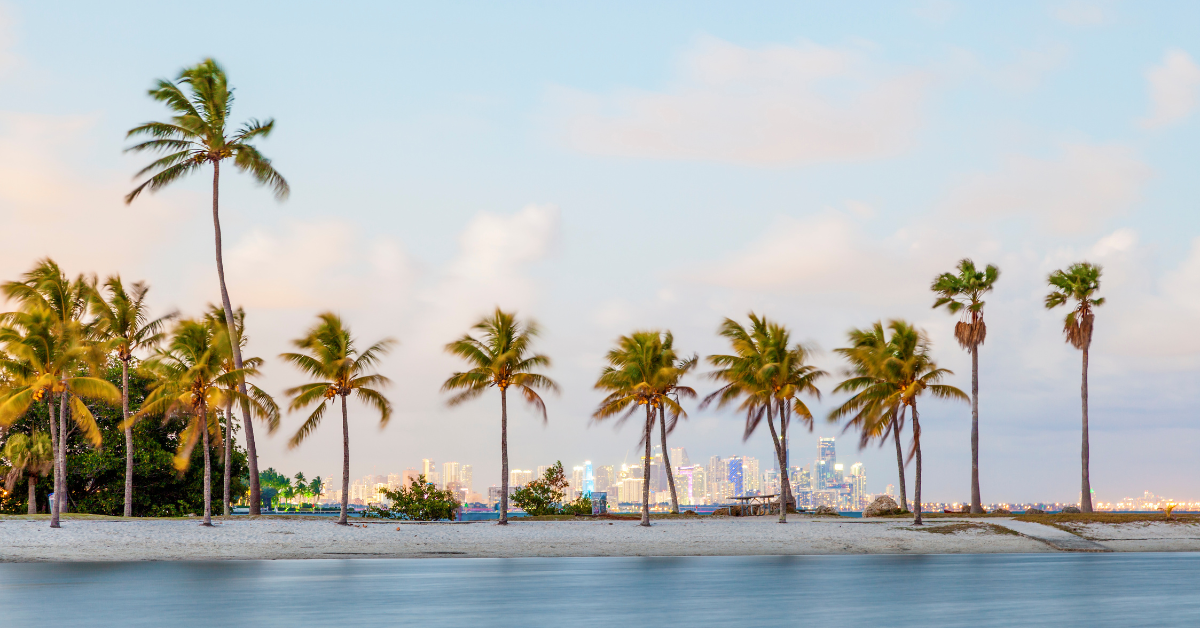In Japanese, Florida is usually written in katakana, but it is sometimes seen in kanji as “弗羅里達.” This is not an official form but a phonetic transliteration. This article explores the background of this usage and examines the tourism and sports-related images Japanese people associate with Florida.
The Kanji Representation of Florida “弗羅里達”
In Japanese, Florida is usually written in katakana as “フロリダ.” However, it can occasionally be found written as “弗羅里達” in kanji. This is not a modern or official usage but an older transliteration that reflects the phonetic sound, influenced by Chinese usage or past Japanese practices.
From the Meiji to the early Showa era, it was common to write foreign place names in kanji. Examples include “亜米利加 (America)”, “加奈陀 (Canada)”, and “濠太剌利 (Australia)”. In the same way, “弗羅里達” appeared as a transliteration, though today it is rarely used.
Here are some representative examples of such transliterations:
| Place | Kanji Form | Reading |
|---|---|---|
| America | 亜米利加 | Amerika |
| Canada | 加奈陀 | Kanada |
| Australia | 濠太剌利 | Ōsutoraria |
| Florida | 弗羅里達 | Furorida |
The Tourism Image of Florida for Japanese People
Florida is rich in tourist attractions, and for Japanese people, it strongly evokes the image of a “tropical paradise.”
Florida as a Southern Paradise
Florida’s subtropical to tropical climate means it is warm throughout the year. Miami and Key West are world-famous resorts, and the combination of blue ocean and white sandy beaches symbolizes “an extraordinary escape” for many Japanese tourists.
The Presence of Disney World
In Orlando, Florida, the Walt Disney World Resort is one of the most iconic attractions for Japanese people. With its vast grounds, multiple theme parks, and entertainment complexes, it has established itself as a symbol of dreams and fantasy.
The Appeal of Nature and Activities
Florida is also home to Everglades National Park, offering wildlife observation, airboat rides, and eco-adventures. The coexistence of nature and modern attractions enhances its appeal for visitors.
Key aspects of Florida tourism can be summarized as follows:
| Tourism Feature | Characteristics | Japanese Impression |
|---|---|---|
| Beach Resorts | Miami, Key West | Tropical paradise |
| Theme Parks | Disney World, Universal | Dream destination |
| Nature | Everglades, wildlife | Extraordinary experiences |
Florida as a State of Sports
Florida is not only a tourist hub but also an important center for sports. With professional teams and training facilities, it draws significant attention from Japanese fans.
Connection with Baseball
Florida is one of the main sites of Major League Baseball’s Spring Training. With Japanese players participating, Florida has become a special place in the minds of baseball fans in Japan.
Basketball and American Football
Florida is home to NBA teams like the Miami Heat and Orlando Magic, as well as NFL teams such as the Miami Dolphins and Tampa Bay Buccaneers. Watching games has become a major attraction for both locals and visitors.
College Sports Fever
Universities such as the University of Florida and Florida State University fuel the excitement of college sports, particularly football and basketball, often covered by Japanese media.
The sports side of Florida can be summarized as:
| Sport | Teams / Base | Features |
|---|---|---|
| Baseball | MLB Spring Training | Frequent Japanese player coverage |
| Basketball | Miami Heat, Orlando Magic | Global popularity |
| American Football | Miami Dolphins, Tampa Bay Buccaneers | Local passion |
| College Sports | University of Florida, Florida State | Nationwide attention |
The Distance Between Kanji Usage and Modern Japanese Perception
Today in Japan, Florida is almost never written in kanji. Instead, it is viewed as an example of cultural transliteration. For most Japanese people, the word “弗羅里達” feels unfamiliar, while Florida’s image as a tourist and sports hub is far stronger.
Younger generations in particular are unaware of the kanji usage. When they encounter it, they may see it as quaint, retro, or historically interesting. In modern contexts, the katakana “フロリダ” is considered natural, while the kanji form survives mainly as a cultural curiosity.
Japanese perceptions by generation can be summarized as:
| Generation | Image of Florida | Impression of Kanji |
|---|---|---|
| Older | May know the old transliterations | Feel nostalgic |
| Middle-aged | Recognize Florida as a tourist/sports state | Find kanji unusual |
| Younger | Associate with Disney World and resorts | Retro and amusing |
Conclusion
Florida is sometimes written as “弗羅里達”, but this is an old phonetic transliteration and is not used in modern Japanese. For Japanese people today, Florida evokes images of “beautiful beaches,” “Disney World,” “a warm climate,” and also of “a major sports hub.”
While the kanji form is historically and culturally intriguing, the modern Japanese view of Florida is dominated by its bright, dynamic image as both a tourist destination and a sports powerhouse.






